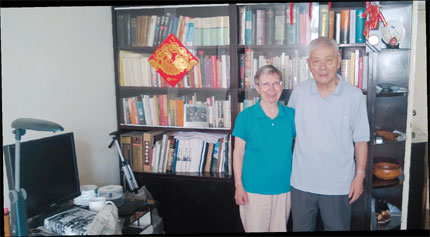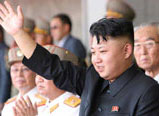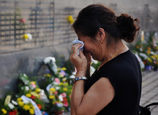
 |
| Shanghai native George Wang and his British wife Betty Barr share a quiet moment at their modest Shanghai home in Hongkou District.(Photo/Shanghai Daily) |
George Wang, 86, and his 80-year-old wife Betty Barr grew up in Shanghai in the 1930s, living in two parallel worlds. His dream of pulling himself up from poverty and her dream of returning to her birthplace finally crossed paths in the city 40 years later.
Their odyssey is an unusual love story, to say the least.
Wang Jincai, the son of a poor blacksmith, has lived in China all his life. Barr was born in Shanghai to a Scottish missionary father and an American mother. The family was interned by the Japanese from 1943 to 1945. She left Shanghai and began studies at Wellesley College in the US in 1950. Her family left in 1952.
Today, as Wang and Barr sit in their modest Shanghai home, the memories flood back. Tears come to Wang's eyes as he remembers his childhood.
"My family was among the poorest and lived miserably like all the poor," he says.
In November 1937, his mother was forced to sell an eight-year-old sister to a wealthier family when money was desperately needed to escape Japanese aggression in Shanghai and flee to the countryside near the city of Ningbo in Zhejiang Province. The family later searched for the sister, but she was never found again.
"I don't want to talk too much about it," Wang murmurs, then drops into silence.
Wang sat in front of his computer in the study of their 80-square-meter apartment on the fifth floor of an old building with no elevator. Books and English newspapers are spread around the room. It may not be luxury digs, but it's home. A happy home.
"We were so poor back then," Wang says, looking around him. "I'm now in heaven."
Wang was born in 1927 into Shanghai family of two parents, five children and a grandmother. All the children had "Jin" in their first names, which means "gold" in Chinese. It was his parents' way of bestowing their dreams on their children. His father struggled to find permanent jobs his whole life, and his mother constantly worried about how to feed the family.
Workers everywhere were downtrodden. Wang recalls how women were beaten by husbands on the streets, as men vented frustrations about their horrible work conditions. Everybody back then treated it as normal, he says.
In his early years, Wang shared the same dream with his parents and siblings - to make enough money to feed the family.
Different jobs
The family was always moving, forced by the war or by rents they couldn't afford. From 1938 to 1949, the family of five lived in a windowless attic of less than eight square meters.
With a primary school degree, Wang managed to get odd jobs as a newspaper boy, a coolie, a messenger boy and a typist to try to help the family out.
"In late 1949, my mother was so happy when I finally made enough money as a typist to allow us to move into a big room in an ordinary shikumen (stone-gated) house shared by eight families," Wang recalls.
When he registered for evening classes in the early 1940s to learn English, Wang changed his first name to Zhengwen, which roughly translates to "upright and culture." He also studied accounting and, well, any other subjects the school had on offer.
"It was probably because I had to stop school and start working at such a young age that I was so very eager to learn and to absorb everything available," he says. "Even today, I read and travel as much as I can. I shall never stop wanting to learn."
In 1988, Wang became an associate professor at Xuhui District Community College, and helped design and write English textbooks for Shanghai schools. He has written two books and a few articles for foreign media.
"My mother would never have dreamed I would turn out so well," he says.
It was at the evening school in Shanghai that Wang met his first wife Eleanor Margaret Schofield, a British teacher and Sinophile since childhood. They got married in 1950, but it was difficult for a cross-cultural couple to live in China after 1949, especially during the "cultural revolution" (1966-76). She became a professor of English literature at the Shanghai International Studies University. She died in 1983.

















 Singer in spotlight after blog post
Singer in spotlight after blog post


![]()
